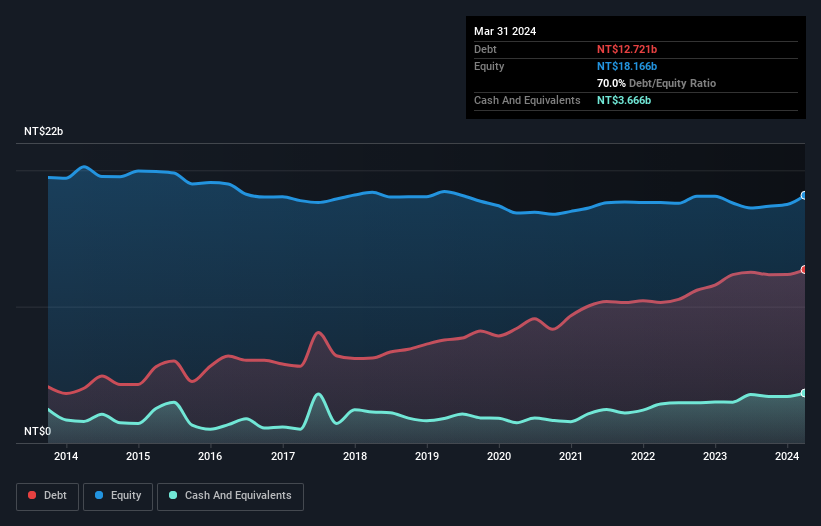- Taiwan
- /
- Paper and Forestry Products
- /
- TWSE:1905
Chung Hwa Pulp (TWSE:1905) Is Carrying A Fair Bit Of Debt
David Iben put it well when he said, 'Volatility is not a risk we care about. What we care about is avoiding the permanent loss of capital.' So it might be obvious that you need to consider debt, when you think about how risky any given stock is, because too much debt can sink a company. Importantly, Chung Hwa Pulp Corporation (TWSE:1905) does carry debt. But the real question is whether this debt is making the company risky.
When Is Debt Dangerous?
Debt is a tool to help businesses grow, but if a business is incapable of paying off its lenders, then it exists at their mercy. In the worst case scenario, a company can go bankrupt if it cannot pay its creditors. However, a more common (but still painful) scenario is that it has to raise new equity capital at a low price, thus permanently diluting shareholders. Of course, debt can be an important tool in businesses, particularly capital heavy businesses. The first step when considering a company's debt levels is to consider its cash and debt together.
See our latest analysis for Chung Hwa Pulp
What Is Chung Hwa Pulp's Net Debt?
The chart below, which you can click on for greater detail, shows that Chung Hwa Pulp had NT$12.7b in debt in March 2024; about the same as the year before. However, it does have NT$3.67b in cash offsetting this, leading to net debt of about NT$9.06b.

How Strong Is Chung Hwa Pulp's Balance Sheet?
We can see from the most recent balance sheet that Chung Hwa Pulp had liabilities of NT$15.4b falling due within a year, and liabilities of NT$2.96b due beyond that. On the other hand, it had cash of NT$3.67b and NT$3.44b worth of receivables due within a year. So its liabilities outweigh the sum of its cash and (near-term) receivables by NT$11.2b.
While this might seem like a lot, it is not so bad since Chung Hwa Pulp has a market capitalization of NT$20.2b, and so it could probably strengthen its balance sheet by raising capital if it needed to. But it's clear that we should definitely closely examine whether it can manage its debt without dilution. There's no doubt that we learn most about debt from the balance sheet. But it is future earnings, more than anything, that will determine Chung Hwa Pulp's ability to maintain a healthy balance sheet going forward. So if you want to see what the professionals think, you might find this free report on analyst profit forecasts to be interesting.
In the last year Chung Hwa Pulp had a loss before interest and tax, and actually shrunk its revenue by 12%, to NT$21b. We would much prefer see growth.
Caveat Emptor
While Chung Hwa Pulp's falling revenue is about as heartwarming as a wet blanket, arguably its earnings before interest and tax (EBIT) loss is even less appealing. Indeed, it lost NT$699m at the EBIT level. Considering that alongside the liabilities mentioned above does not give us much confidence that company should be using so much debt. So we think its balance sheet is a little strained, though not beyond repair. Another cause for caution is that is bled NT$217m in negative free cash flow over the last twelve months. So suffice it to say we do consider the stock to be risky. When analysing debt levels, the balance sheet is the obvious place to start. But ultimately, every company can contain risks that exist outside of the balance sheet. To that end, you should be aware of the 2 warning signs we've spotted with Chung Hwa Pulp .
When all is said and done, sometimes its easier to focus on companies that don't even need debt. Readers can access a list of growth stocks with zero net debt 100% free, right now.
New: AI Stock Screener & Alerts
Our new AI Stock Screener scans the market every day to uncover opportunities.
• Dividend Powerhouses (3%+ Yield)
• Undervalued Small Caps with Insider Buying
• High growth Tech and AI Companies
Or build your own from over 50 metrics.
Have feedback on this article? Concerned about the content? Get in touch with us directly. Alternatively, email editorial-team (at) simplywallst.com.
This article by Simply Wall St is general in nature. We provide commentary based on historical data and analyst forecasts only using an unbiased methodology and our articles are not intended to be financial advice. It does not constitute a recommendation to buy or sell any stock, and does not take account of your objectives, or your financial situation. We aim to bring you long-term focused analysis driven by fundamental data. Note that our analysis may not factor in the latest price-sensitive company announcements or qualitative material. Simply Wall St has no position in any stocks mentioned.
About TWSE:1905
Chung Hwa Pulp
Manufactures, sells, and distributes pulp, paper, paperboard, chemical products, and fertilizers in Taiwan and Mainland China.
Fair value with imperfect balance sheet.
Market Insights
Community Narratives


Recently Updated Narratives


MINISO's fair value is projected at 26.69 with an anticipated PE ratio shift of 20x


The Quiet Giant That Became AI’s Power Grid


Nova Ljubljanska Banka d.d will expect a 11.2% revenue boost driving future growth
Popular Narratives


The company that turned a verb into a global necessity and basically runs the modern internet, digital ads, smartphones, maps, and AI.


MicroVision will explode future revenue by 380.37% with a vision towards success



